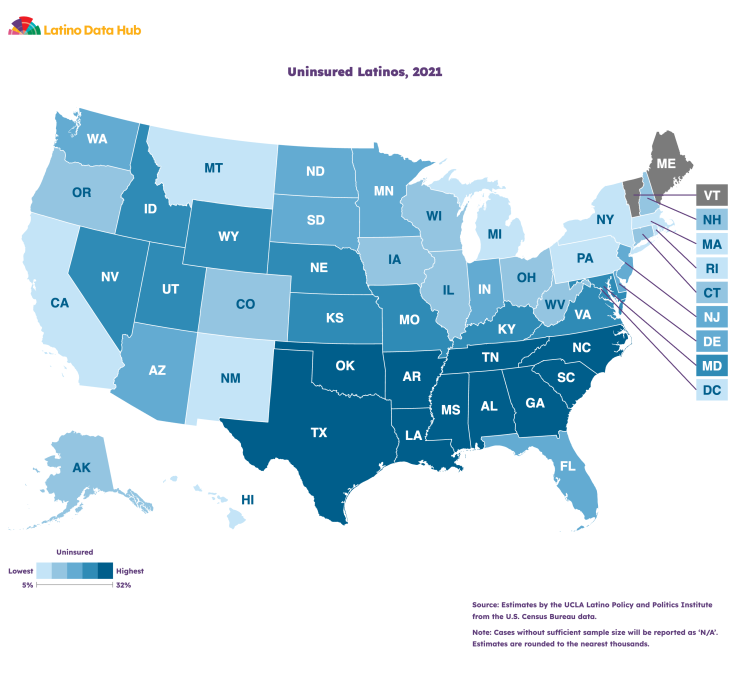
Latinos in the U.S. have historically lacked health insurance, which has left them more vulnerable to the financial impact of having to afford sickness and hospitalization, as well as a higher risk of developing conditions that could have been prevented by regular check-ups potentially avoided by the cost of consultation. According to U.S. census data, 24.9% of working-age Latinos lack health insurance; and additional information from the Latino Data Hub revealed that Latinos in the Southeastern U.S. have more difficulty getting insurance.
According to the data hub, which is a new project from the UCLA Latino Policy and Politics Institute, states in Southeast U.S. have the largest share of uninsured Latinos. Georgia is the state with the most uninsured Latinos, with 32% of the state's Hispanic population lacking health insurance.
Other states with large shares included Tennessee (31%), Mississippi (30%), North Carolina (29%) and Texas (28%).

Similarly, this region, which encompasses some 14 states, also showed low rates when it came to Latinos covered by Medicaid, a government-funded health insurance program, and Latinos who received health insurance through their employer.
Lack of health insurance and healthcare access in the Latino community has led the demographic to be more susceptible to heart disease, strokes, diabetes and unintentional injuries, according to the U.S. Department of Health and Human Services Office of Minority Health. The COVID-19 pandemic's disproportionate impact on Latinos also showed how devastating a lack of health insurance and healthcare access can be for the group.
According to the Center for American Progress, an independent, nonpartisan policy institute, during the pandemic, Latinos were 1.7 times more likely to contract COVID-19 and 4.1 times more likely to be hospitalized from complications of the disease than their non-Hispanic white counterparts. Latinos were also 2.8 times more likely to die from COVID-19 than white residents, according to the data.
A study from the Online Journal of Issues in Nursing (OJIN) also found that among the Latino community, COVID-19 symptoms were exacerbated and made worse because Latinos were "less likely to have health insurance, making it difficult to receive care."
During the pandemic, Southeastern states with low rates of insured Latinos also saw many deaths among their Hispanic population. According to KFF and independent health policy research, polling, and journalism source, in Texas, 41% of the COVID-related deaths were from Latinos and in Florida, Latinos made up 23% of the COVID deaths. While the figure is higher than the proportion of Latinos in Texas, it's lower in Florida.
Lack of health insurance among Latinos is an issue that has persisted for many years in the U.S., and it is an issue that many nonprofit organizations have been working to remedy. Last year, UnidosUS launched a campaign to inform Latinos about health insurance and enroll eligible people in health plans.
© 2025 Latin Times. All rights reserved. Do not reproduce without permission.





